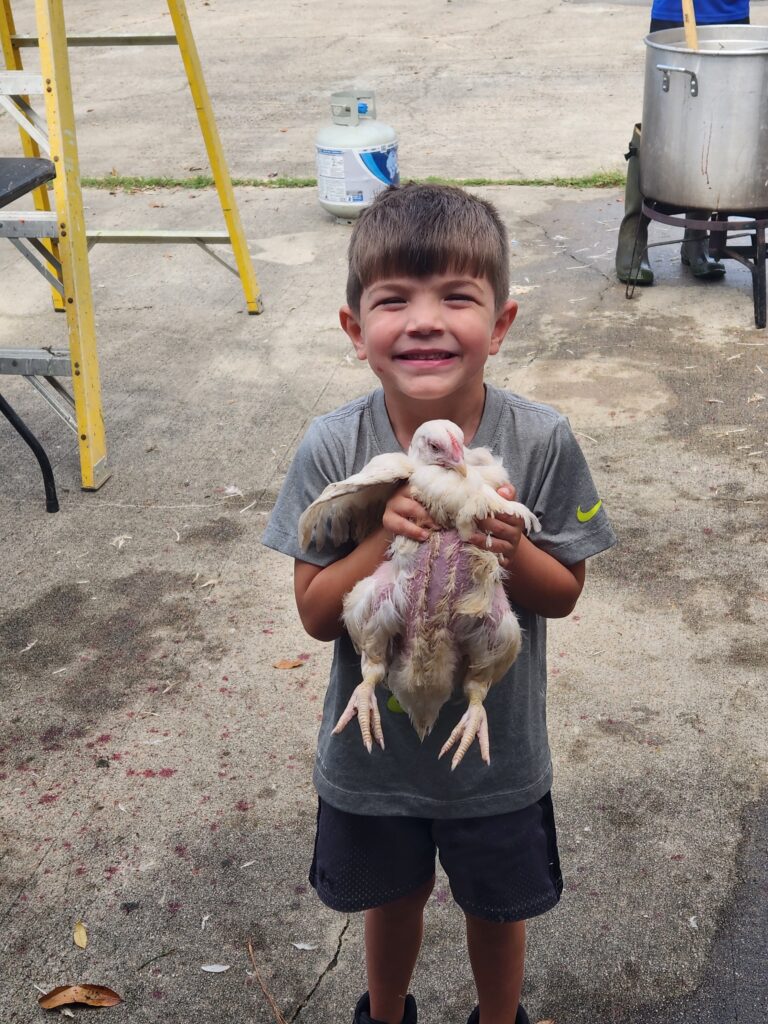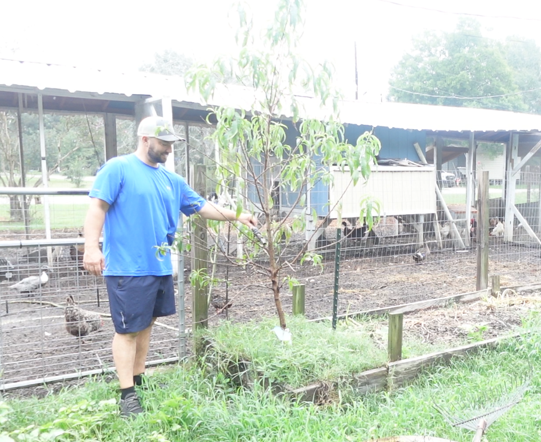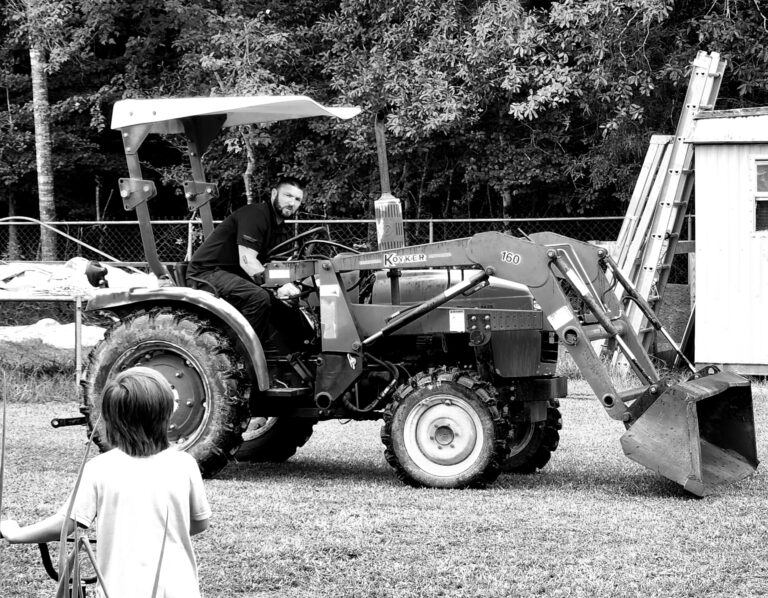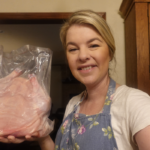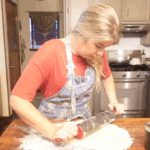Southeast Texas
How to Raise Chickens for Meat: A Beginner’s Guide
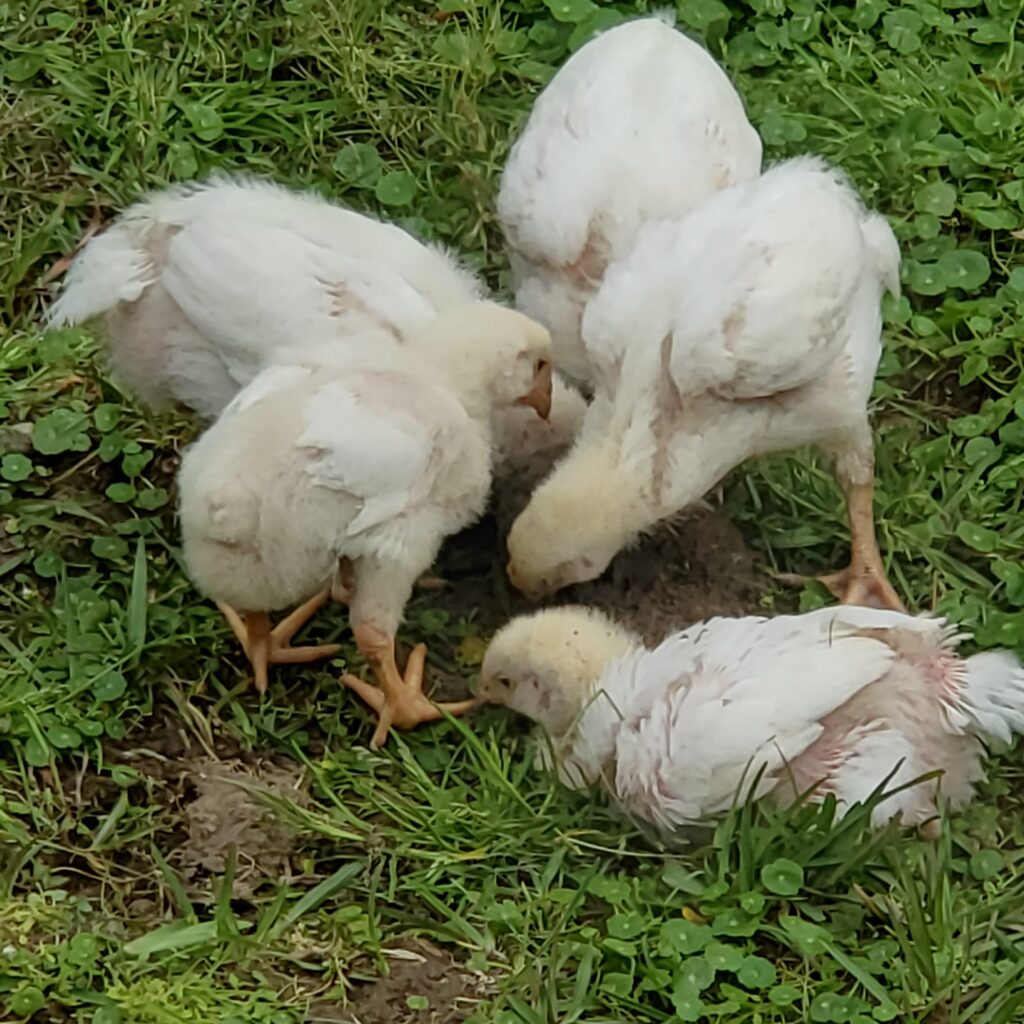
The Truth About Store Bought Meat
If you are reading this, you are probably tired of buying subpar chicken from the grocery store. Commercial chicken houses are filled with unhealthy living conditions, diseases, and quite frankly…. abuse. These chickens never see the sun, are never on fresh grass, and are trampling over each other and their own feces. In order to combat disease, they are pumped with antibiotics, which in turn ends up in your meat. This is why we are sharing how to raise chickens for meat.
Not only are the chicken houses questionable, so is this newfound “science” of lab created meat. It is hard to know what you are actually buying when you are reaching for packaged chicken to put into your Buggie. You are taking someone else’s word for it!
We were not comfortable with the uncertainties of what was being offered at the store and as meat being the primary part of our diet, we were not willing to take that chance. We decided to take control of our food.
How Many Do We Raise?
We raise roughly 100 chickens for meat on our property every year. We came up with this number by deciding how many times a week our family of five eats chicken. The magic number was one time a week. So, we make sure we have about fifty or so chickens to last us throughout the year. The other fifty birds are usually for another family that we help by raising their chickens on our property. We just split the cost, and everyone helps on butcher day.
You may say you do not have enough land to raise this number of chickens. Well, truth be told, we only have .73 acres at the Hagan Homestead. Trust me, it can be done. You just have to be strategic and think outside the box, maximizing every bit of grass you have!
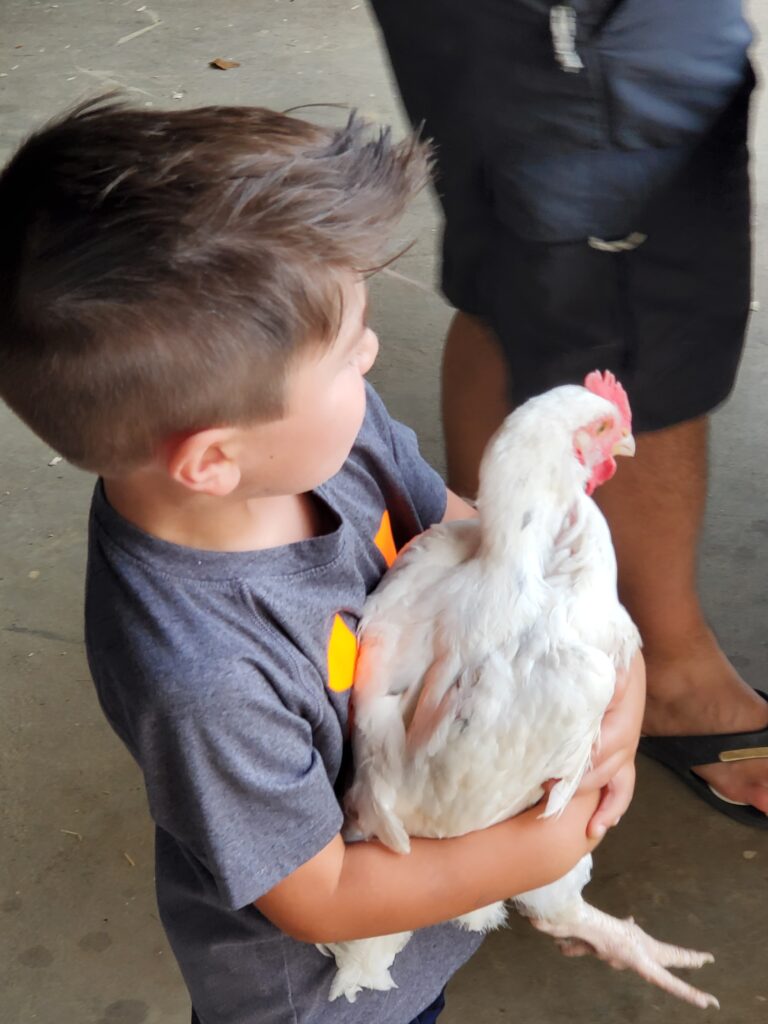
Where We Get Our Chickens
We have tried a few hatcheries and even good old Tractor Supply. We have had the best luck with Murray McMurray Hatchery – Hatching the Highest Quality Baby Chicks and Poultry
For small scale homesteading we recommend the Cornish Cross. Their grow out time is approximately eight weeks. When you are working with limited land like us, you will run out of grass for the longer grow out birds such as the Freedom Rangers or Big Red Broilers. Although, we do like the Big Red Broiler meat better we just do not have the land to raise them for a total of twelve weeks.
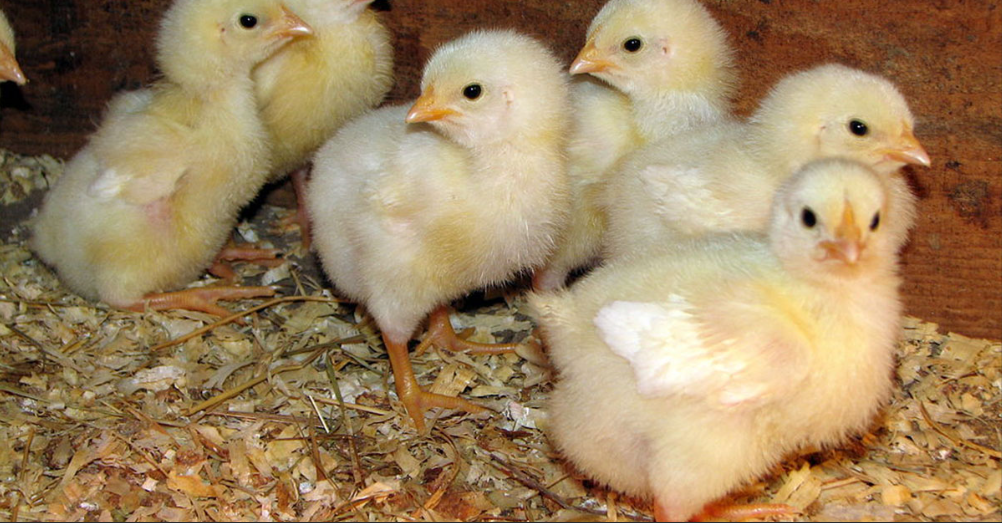
At Murray and McMurray, their quality and customer service are excellent.
Once you place your order, the baby chicks will come in the mail. When the post office calls you better be ready!
What You Will Need When You Get the Call That Your Chicks Are In
Our meat birds came in! Click this link to watch how we prepare for our chicks
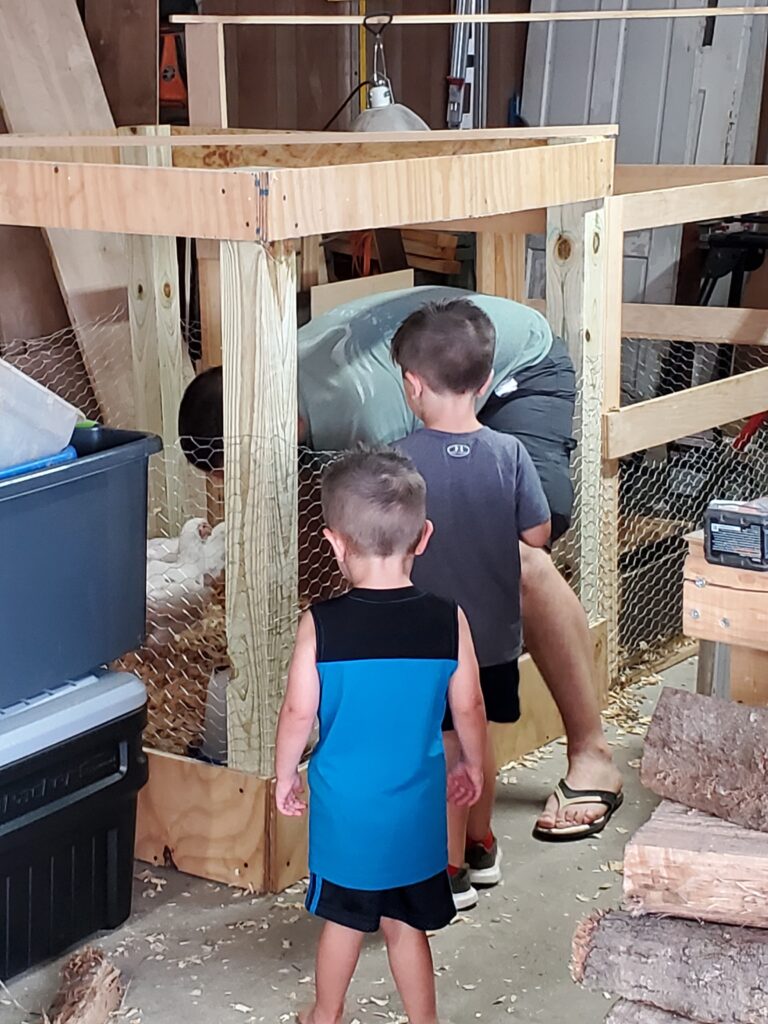
- Brooder- This is a chick nursery if you will. The picture above is the first one that we built. You could easily use a tote or trough. Just make sure that they are secure from predators (even household dogs) getting in and them flying out. Here is one that you can buy from premier one if you do not want to build one yourself. QuikClean Chick Brooder – Premier1Supplies
- Heat source- There are a few options on the market. You can use a heat lamp Prima Heat Lamp – Premier1Supplies or a heat plate Heating Plates for Chick Brooders – Premier1Supplies. Heat plates tend to be safer in regard to fire risk.
- Pine shavings- This is important! They need clean bedding to stay healthy.
- Water source- For this age, a smaller one is better. Top Fill Poultry Waterers – Premier1Supplies We also make “magic water”. To do this add a splash of apple cider vinegar, a little honey and some garlic. This gives them a much-needed immune boost after their long travel. This is only incorporated for their first jug unless you see a need for further use.
- Feed- Here you will have to decide what you want to feed your birds. We NEVER do medicated feed. You will also need to decide if you want organic, non-GMO, conventional feed, etc. There are so many options so do your research. This is what we have used Nature’s Best Organic Chick Starter/Grower Crumble Chicken Feed, 40 lb. Bag at Tractor Supply Co.
- Chick feeder- You want something they can easily access. Flock Party 7 lb. 15-Bird Chicken Feeder at Tractor Supply Co.
When to Move Your Chicks to Grass
Your chicken nuggets will stay in the brooder for about 3 weeks, it just depends on how they feather out. It could be up to four weeks. This gives you time to get your chicken tractors built if you have not already. There are several different options. We have even used a 10X10 dog kennel in a pinch!
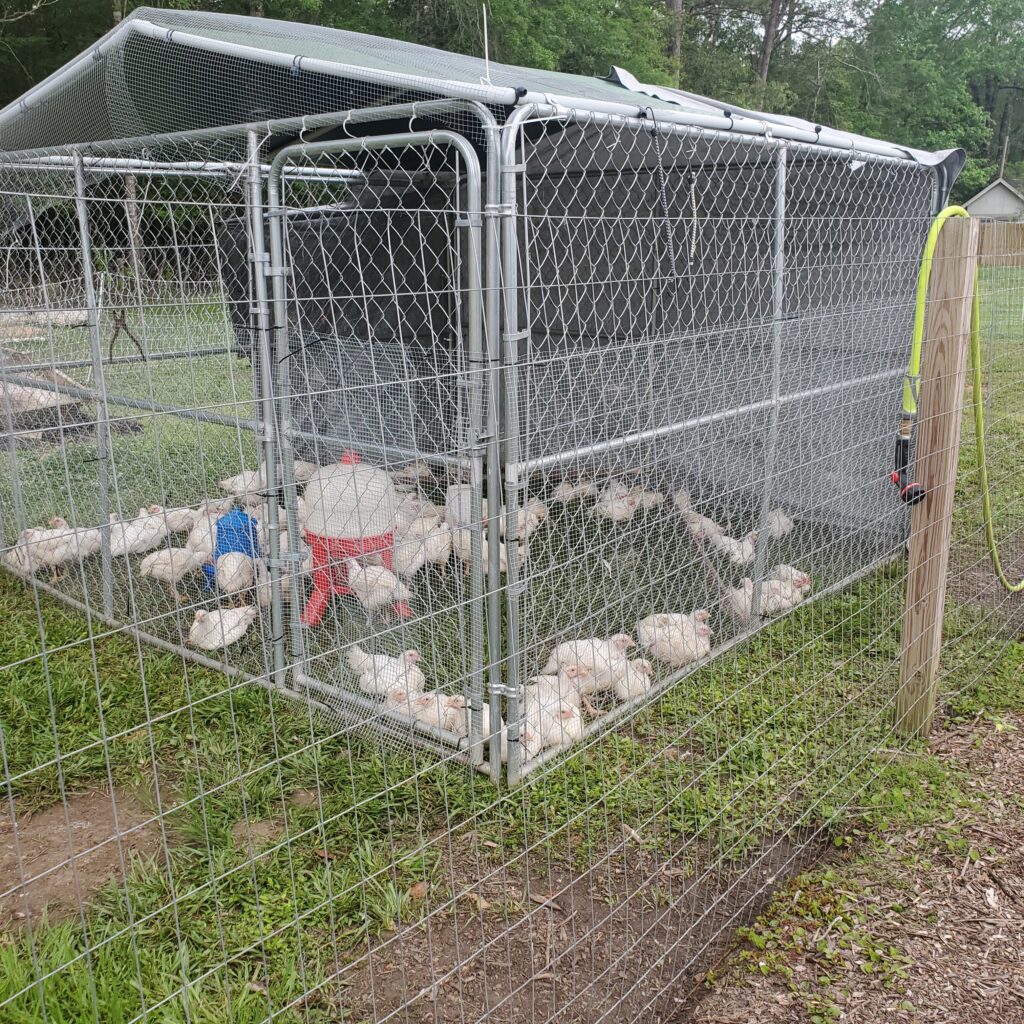
If you are on a budget use what you have. Justin even built this chicken tractor in our earlier days of homesteading. It was not super predator proof but worked well for where we were at the time.
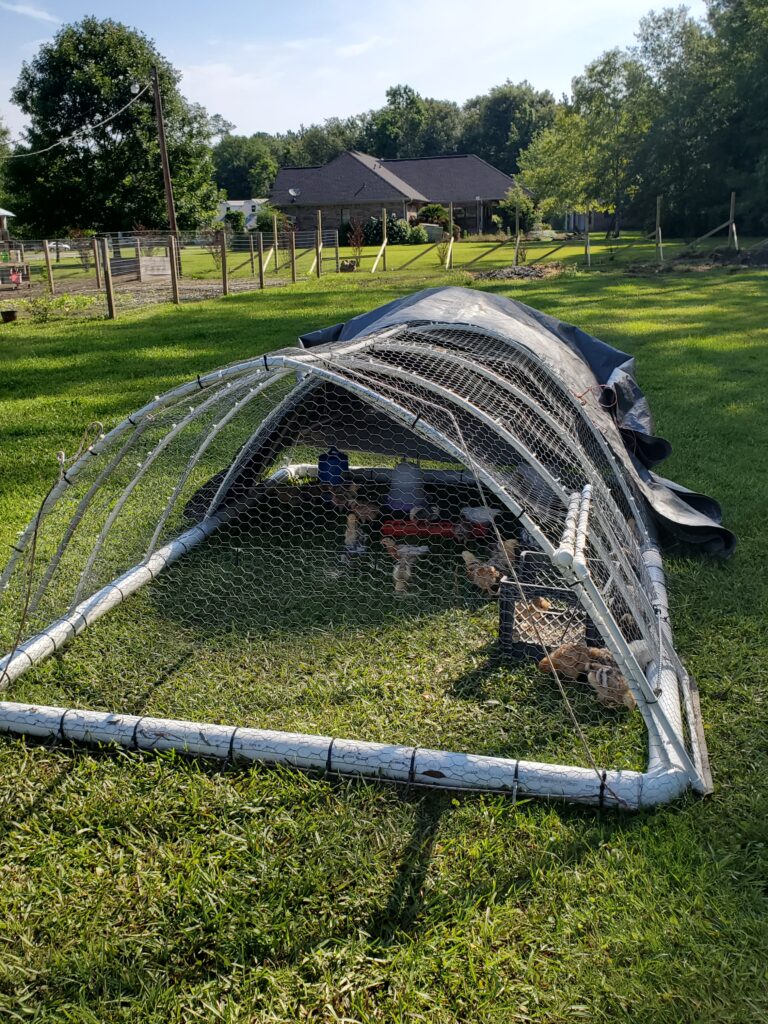
Now we use the Suscovich Chicken Tractor. It is a great option and light weight for easy moving. Our older children can even move it!
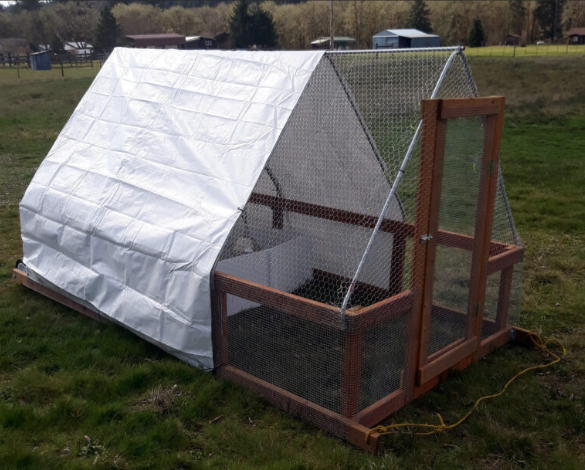
This Tractor allows us to walk in to pour feed and tend to the chickens. It will house about 40-50 birds, so we have two on our homestead. When we build the next one, we will do some modifications. We want to round off the top of the tractor giving even more access to our birds. This will make it, so we do not have to hunch over as much.
Joel Salatin Polyface Farms Virginia Premium Grass-Fed Meats – Polyface Farm also has another version of a chicken tractor that works well for his operation.
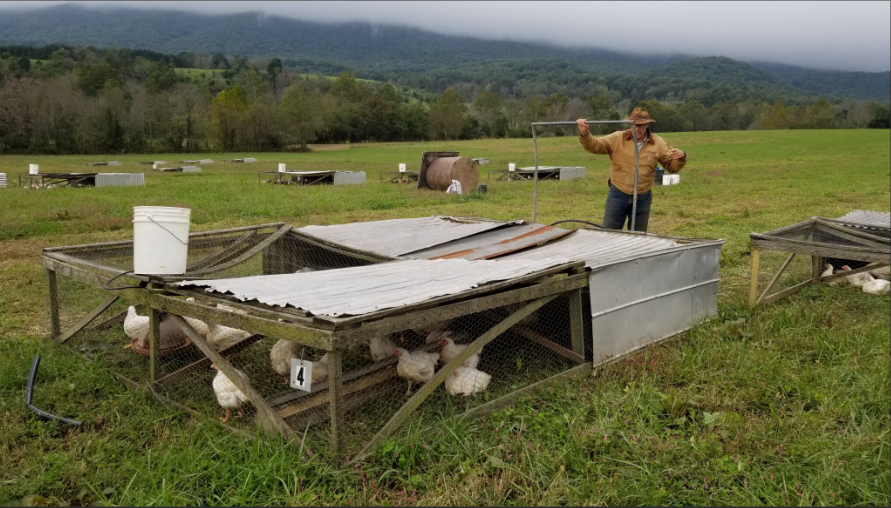
Along with your chicken tractor you will need a trough and a big waterer. Justin has made our troughs from PVC pipe and some rope. He hangs them off the ground in order to keep the feed clean because they will get in it and poop.
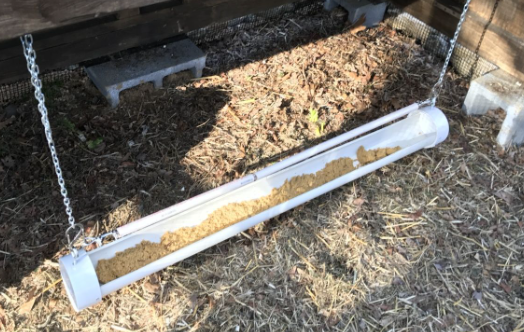
For the waterer, you can just suspend it from the tractor as well. We have also been looking to add an external waterer using a five-gallon bucket, so we do not have to enter the tractor for everything.
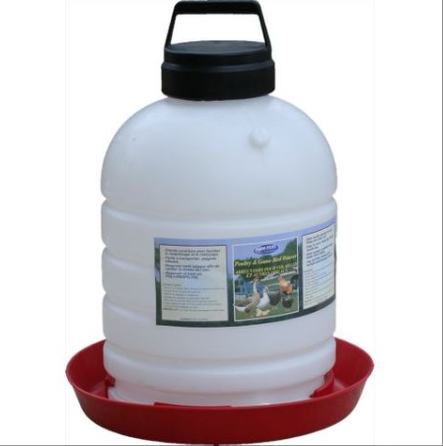
Having wheels on your tractor is also important so that you can easily move them every day.
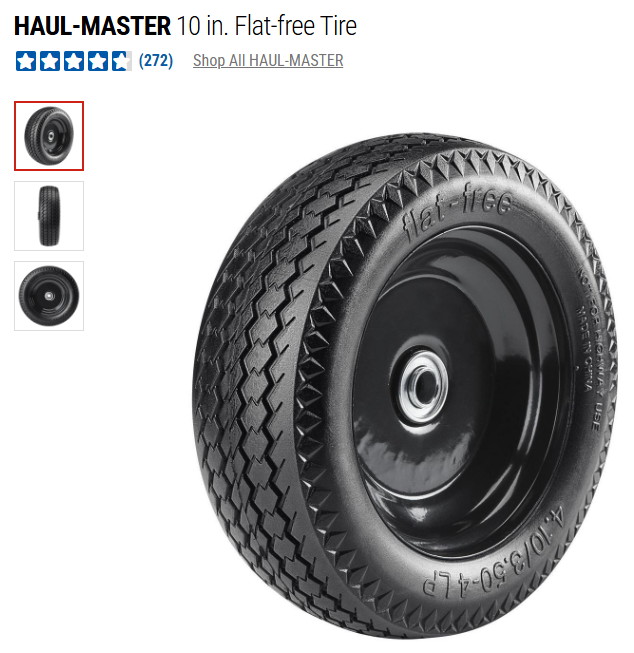
Raising Them Up Right
Now that you have moved your chickens to grass, where do you go from here? The reason you use chicken tractors is to move them! Your chickens will need new grass each day. When they get to be bigger moving them twice a day is ideal. This allows for a healthy environment for them to grow. You don’t want them walking around in their own poop!
This year Justin kept our chickens in feed 24/7 which made a huge difference. We used to feed a heaping amount one time a day and our average weight was around 5 pounds. Choosing to keep them in feed 24/7 our heaviest weight was 7.8 pounds, and the average was about 6.5 pounds. Now those are some big birds!
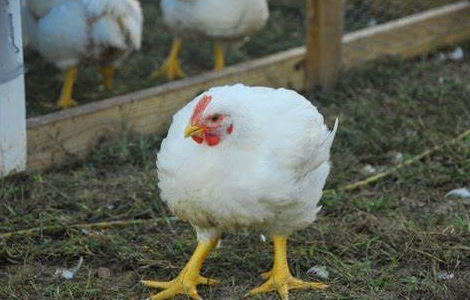
The feed we use for this stage is Nature’s Best
Preparing For Butcher Day
This is day that we, well dread. It is a day of sacrifice and hard work. No one looks forward to this day but is however necessary. It is a day that you must prepare for and there is equipment needed but when we first started out, we did not have all of this! We just made it work and got it done. In our new set up, this is what you will find.
- Kill cones- This is necessary for a quick and painless kill. No ringing the neck on the Hagan Homestead. In the past we have attached them to a board and propped it up between 2 ladders.
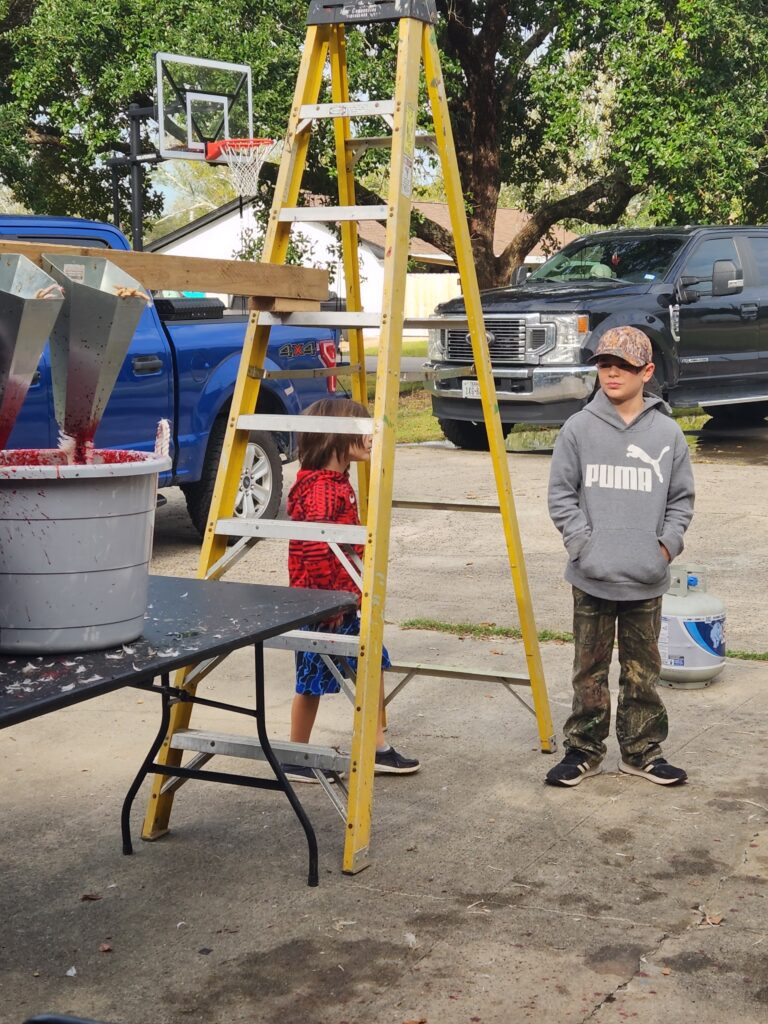
Now Justin has made a stand that holds four kill cones. It also has half of a fifty-gallon barrel to catch the blood for use in the garden, nothing goes to waste. Amazon.com : Holdly Medium Size Chicken Cone Galvanized Steel Poultry Restraining Cone for Chicken,for Large Layers, Broilers, Roasters, Turkeys Up to 8 Pounds Flat-Back Poultry Killing Cone Easy to Clean : Patio, Lawn & Garden is a link for the slaughter cones
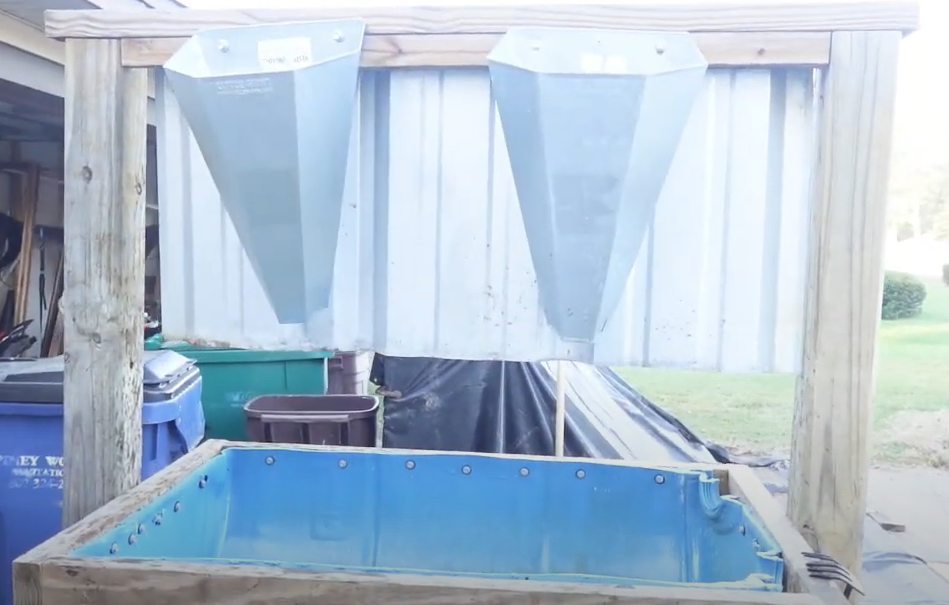
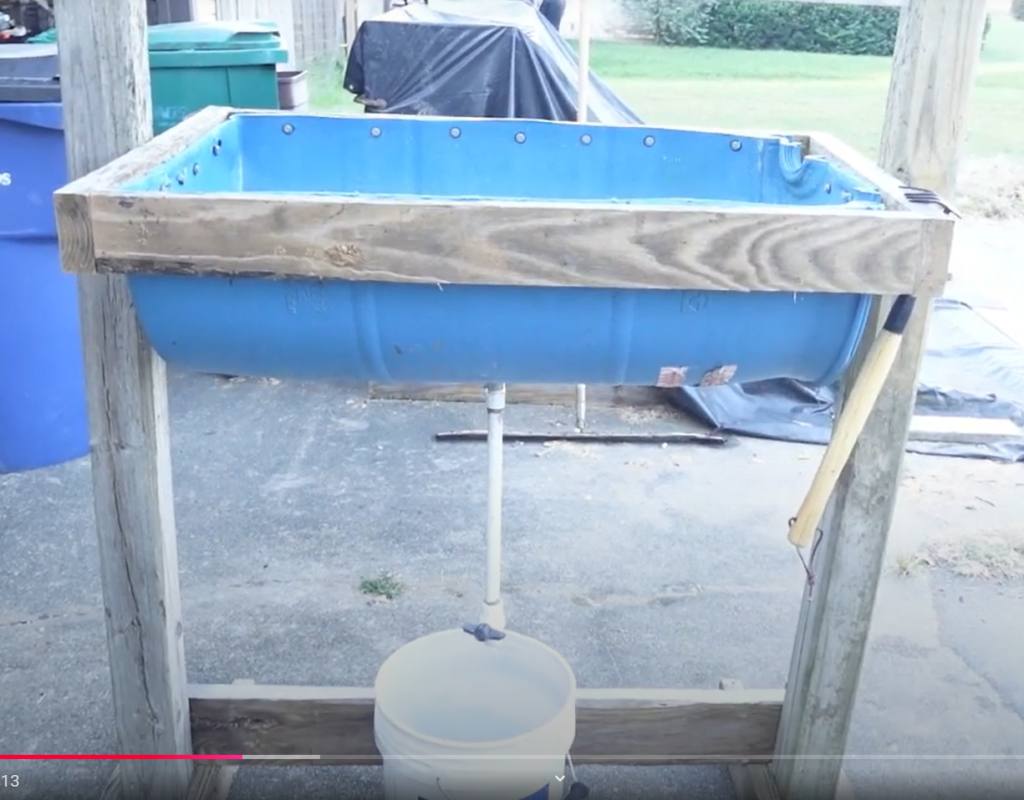
Having the chickens upside down in these cones has a sedative effect and relaxes them. We use razor blades for cutting the carotid artery. This way we can change the blades out regularly to ensure a painless death.
- Scalder- So far, we have always used a big crawfish pot with a propane burner. You will need to make sure you have a thermometer handy! If the water gets too hot, you will have problems. We plan to upgrade to an electric scalder for next year because it is easier to regulate the temperature.
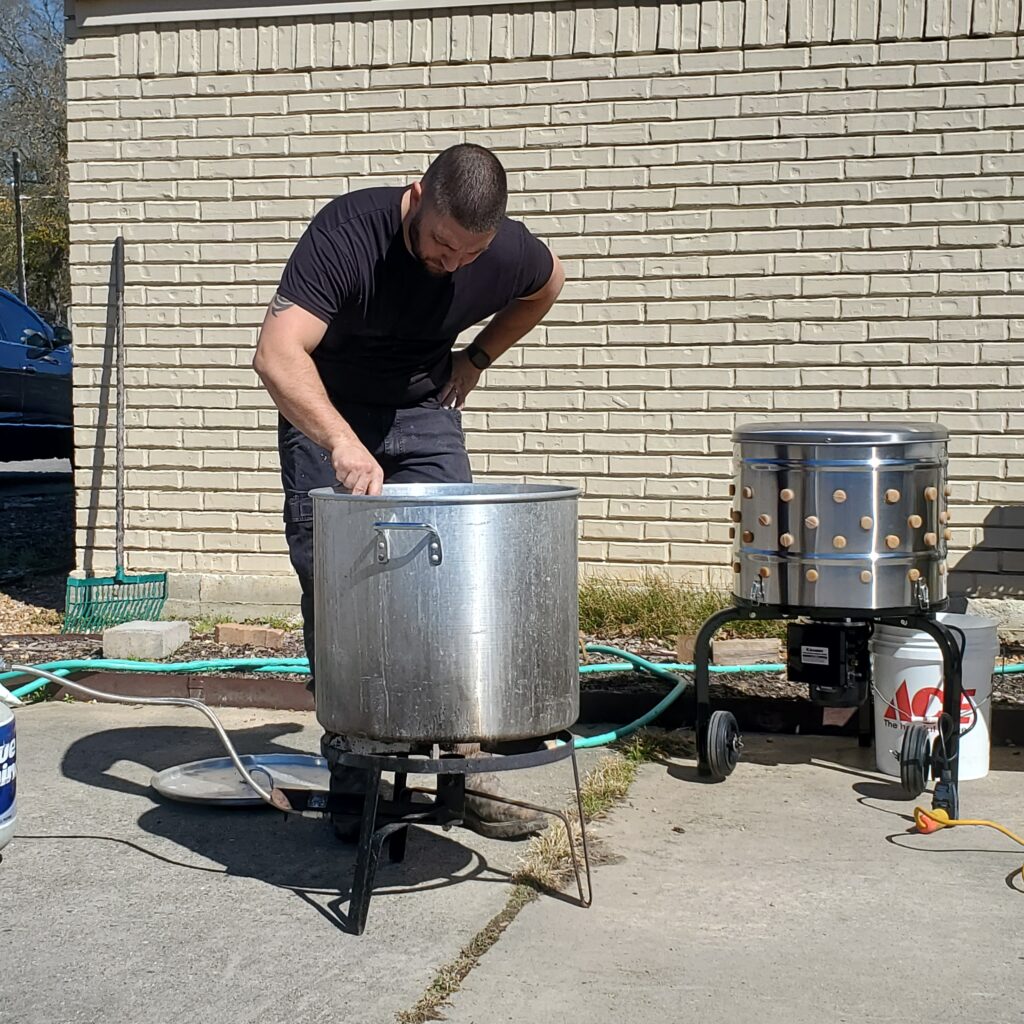
- Plucker- We quickly realized after our first butcher day that a plucker is a MUST HAVE! It takes about 10 seconds or so and that bird is naked with the skin intact. Chicken Plucker Machine, Feather Plucker with 20 in. Dia Stainless Steel Drum Defeathering Equipment
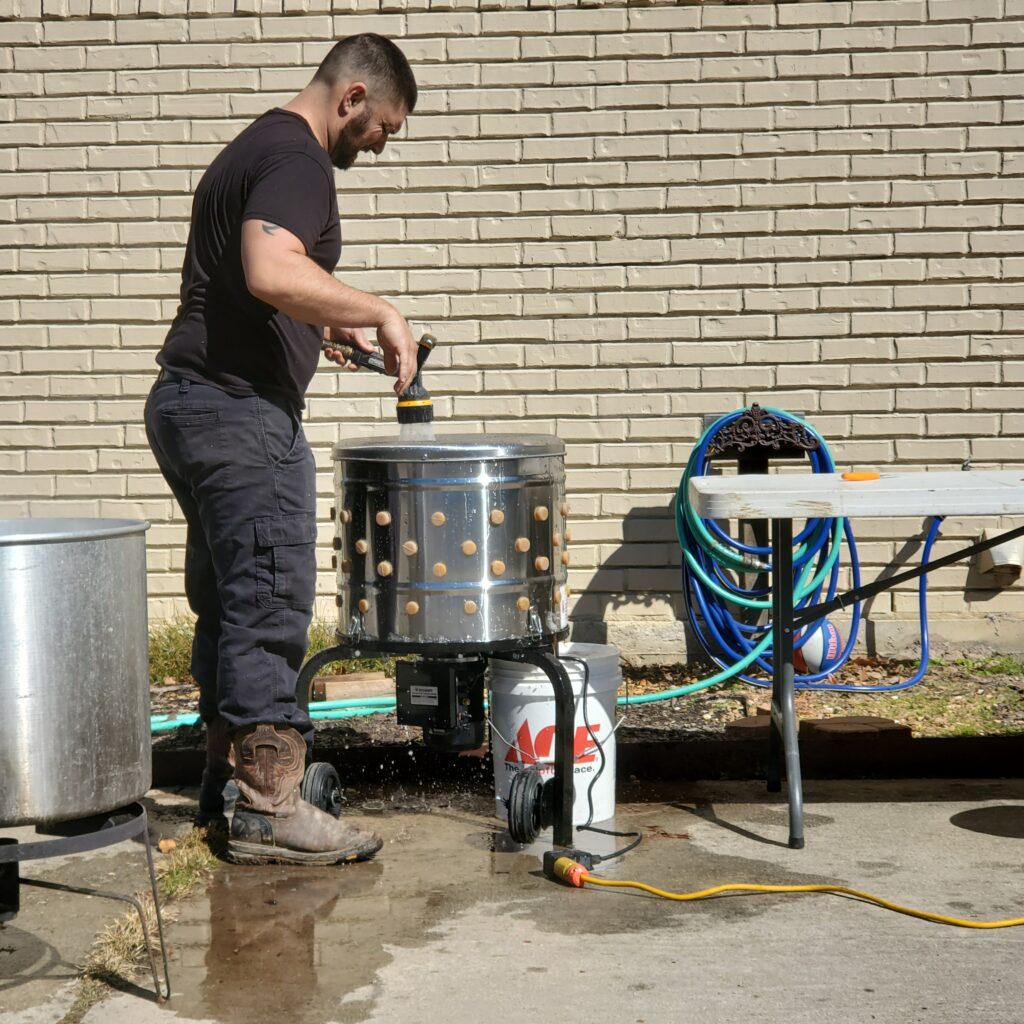
- Tables for eviscerating- This station is customizable and needs several elements. You will need soap, sharp knives, five-gallon buckets for “guts”, trays if you plan on saving organs, a water hose, and anything else to keep this area clean and efficient. This will be your “bottle neck” of butcher day, so plan to have several hands-on deck.
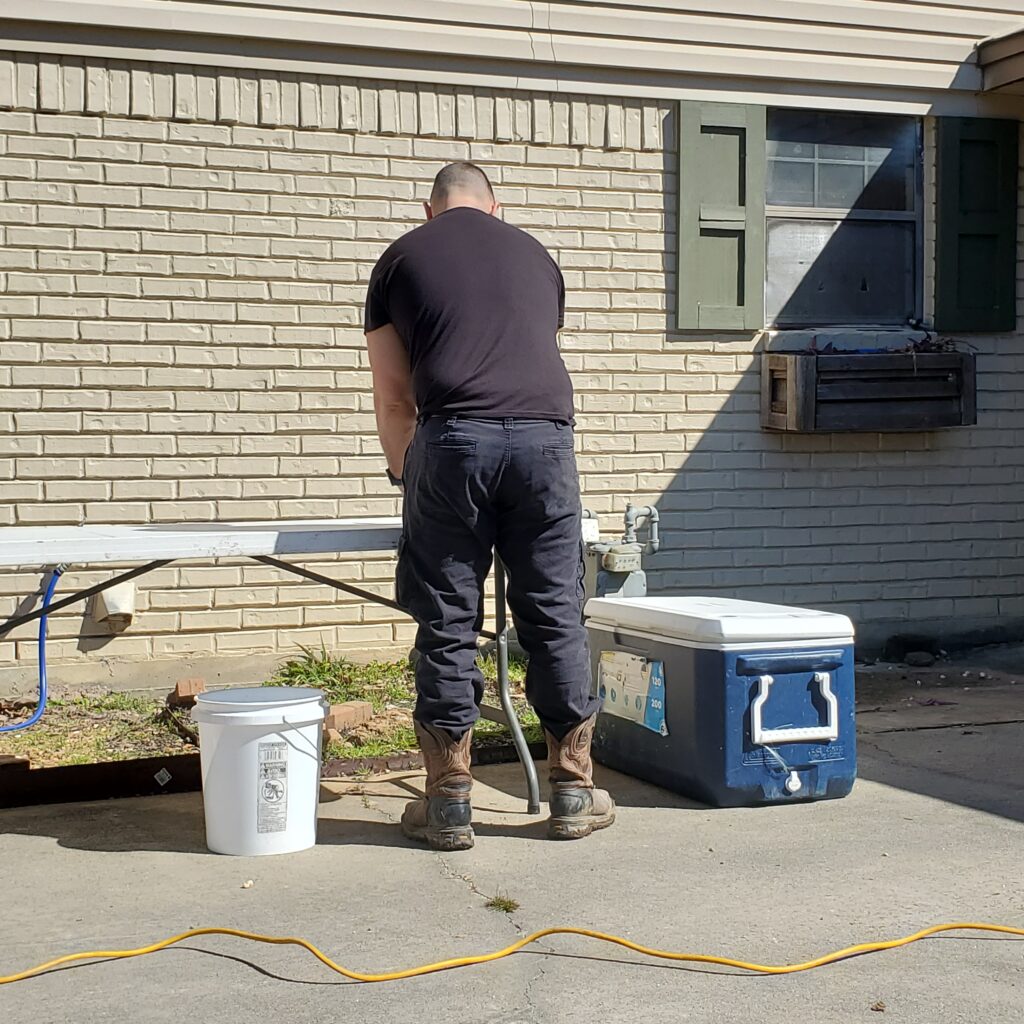
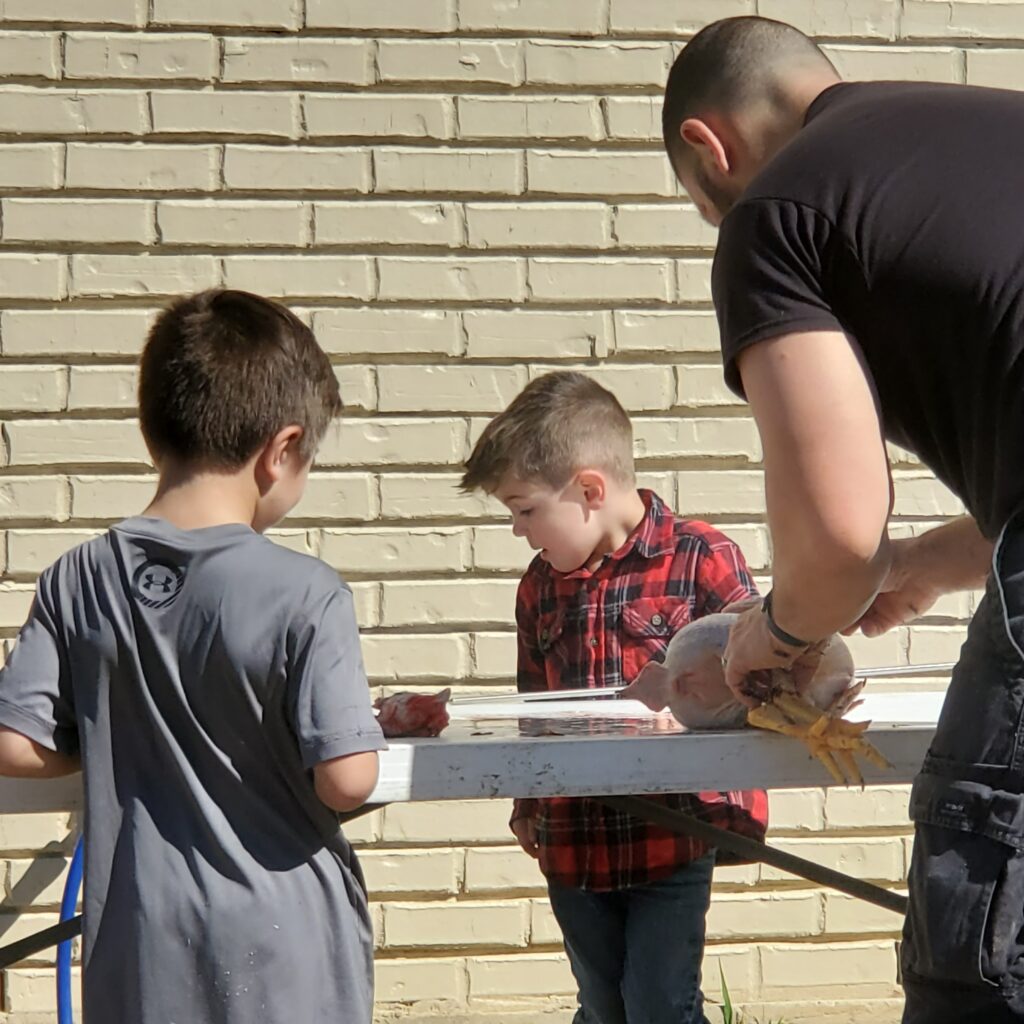
- Ice chests and lots of ice- This is where your birds will go after being processed. This brings their temperature down and keeps them cool until they are packaged.
- Vaccuum sealer and packaging bags- We started out using the food saver kitchen appliance, which is great for small kitchen freezing but not more mass chicken packaging. This year we upgraded and saved my sanity, since this is my primary job. Amazon.com: Weston Brands Vacuum Sealer Machine for Food Preservation & Sous Vide, Extra-Wide 5mm Bar for Sealing Bags up to 16″ Wide, 935 Watts, Commercial Grade Pro 2300, Stainless Steel (65-0201): Westen Food Savor: Home & Kitchen

- Freezers- Either stand up or chest freezer
Making Butcher Day a Success
You will need help, so call your friends and get your kids involved. Our boys could probably butcher chickens on their own now…. not that we would let them, can you imagine?
Everyone needs a dedicated job for this to run like a well-oiled machine. One person kills, one scalds, one plucks, several will eviscerate, and one or more people can do quality control and packaging.
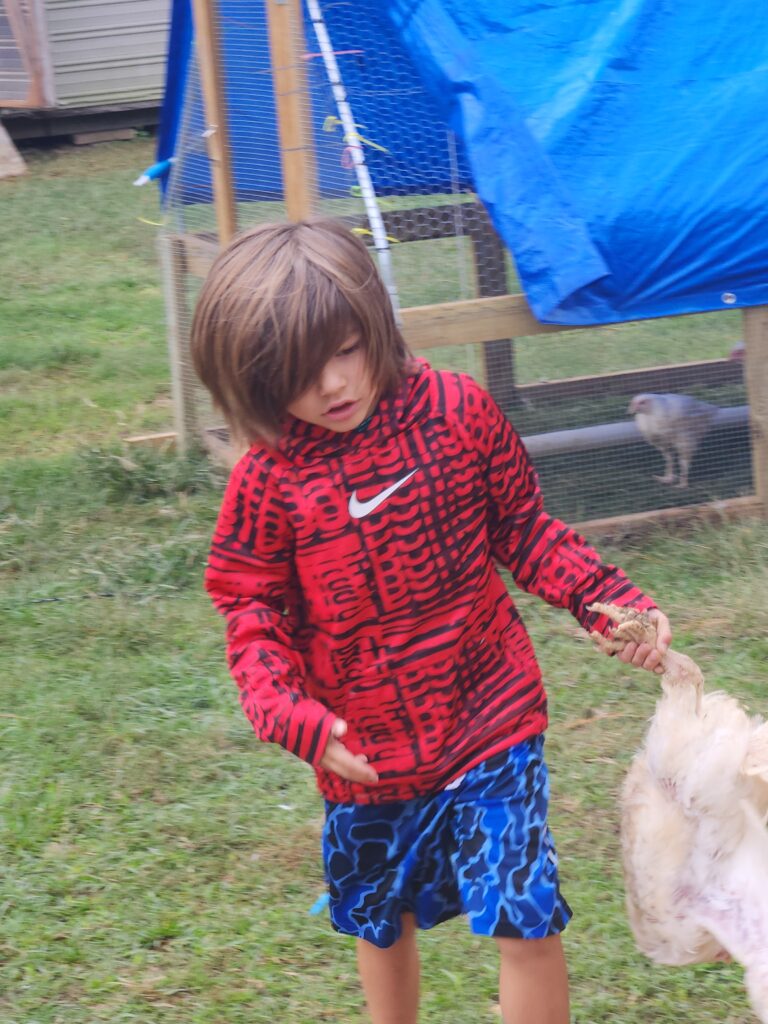
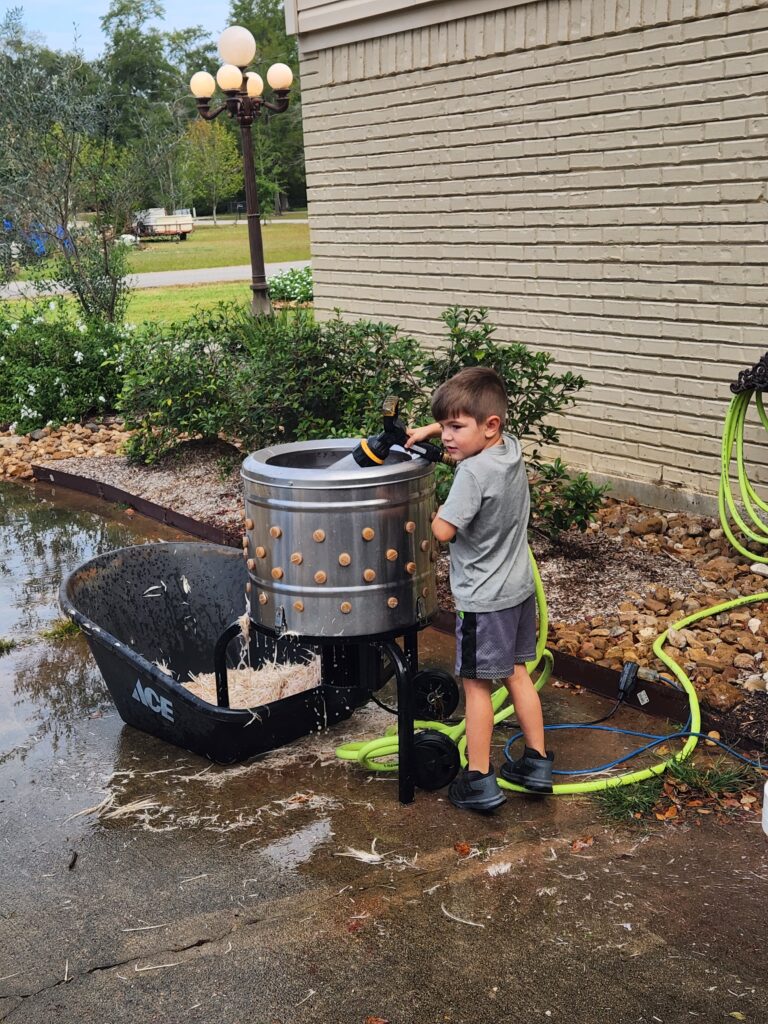
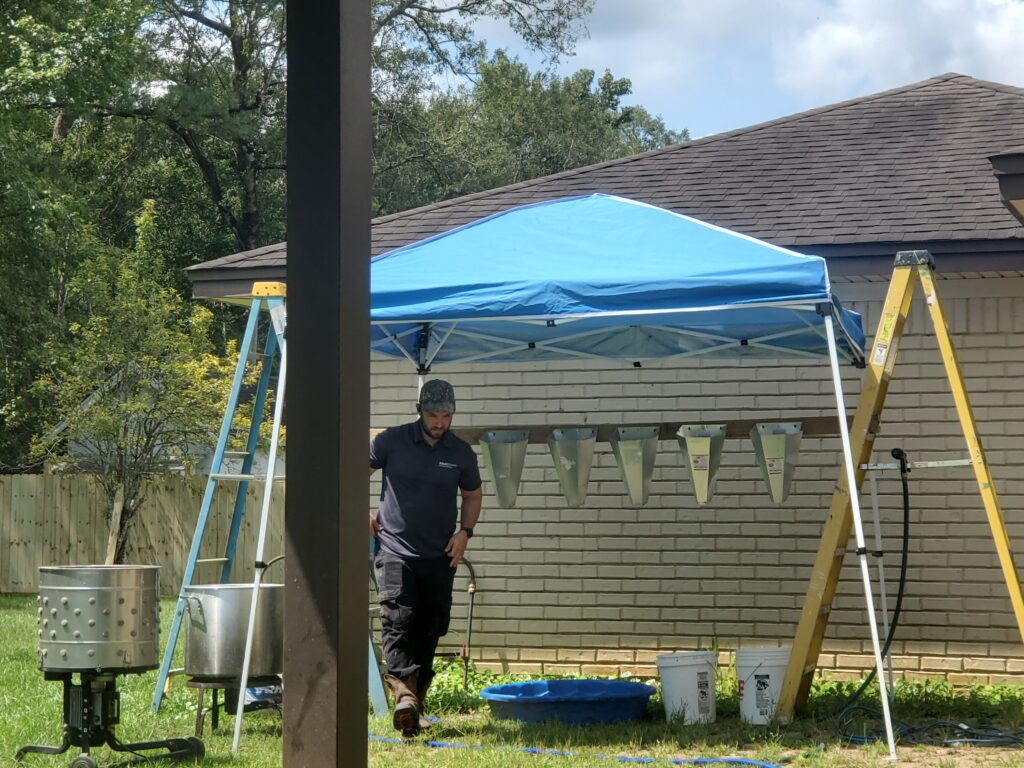
Packaging
This is something you can do on butcher day or do it in the days to follow. If you are new to this, we would recommend doing it on the following day. As a beginner, you may be overwhelmed with everything that goes on with butcher day. Then there is also the cleanup which takes a while.
We have been doing this for many years now so we can butcher, package and cleanup all in a day’s time. Make sure to have sharp knives so that your cuts turn out well.
You can package your birds in a few different ways. We do a mixture.
- Breasts
- Wings
- Thighs
- Drumsticks
- Full leg quarters
- Tenders
- Broth bags- contains 3 carcasses, necks and feet to make broth throughout the year
- Organs separated
- Whole Chicken
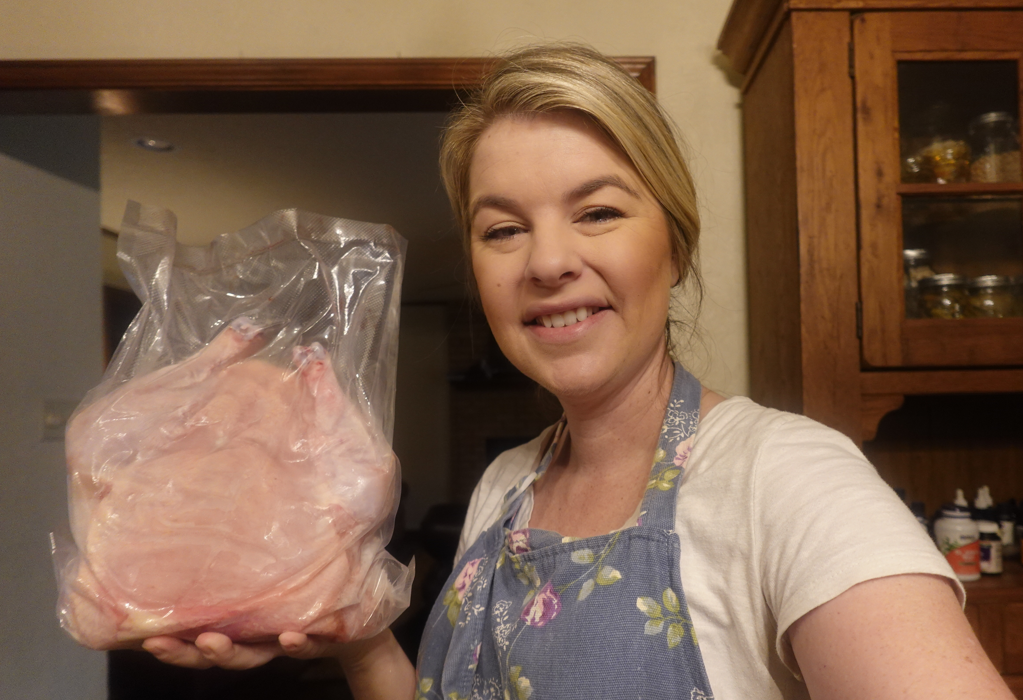
You can also pressure can your chicken for a convenient, already cooked option!
Well, That Concludes Our Beginner’s Guide to Raising Your Own Chickens For Meat
I hope this gives you an idea of how we raise and butcher one of our protein sources on the Hagan Homestead. It gets easier with each year and with each upgrade in equipment. This did not all happen overnight.
So, Take the plunge and get started raising your very own meat chickens. Visit Hagan Homestead to see our 2024 butcher day for some more inspiration.
